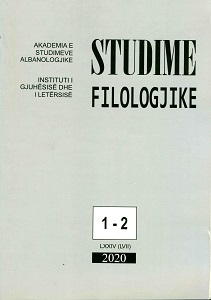Roli i letërsisë në formimin e imagjinarit të një vendi: Rasti i letërsisë shqipe në Itali
The role of literature in national image creation - The case of Albanian literature in Italy
Author(s): Majlinda BregasiSubject(s): Albanian Literature, Theory of Literature, Sociology of Literature
Published by: Qendra e Studimeve Albanologjike
Keywords: Albanian literature; Italy;
Summary/Abstract: As several studies have stressed the importance of a comparative analysis of national dishes employed in different literatures this article will outline unexplored problems of this complex process relating to Albanian authors who write in Italian. Literature plays an important role in historic memory, and myths created by writers can play also a significant political role. Taking into account the habits of individuals and groups to project undesirable phenomena on members of minority groups and particularly on foreigners, many books and articles have examined the use of negative cliches and have considered the custom of assessing everything that is unfamiliar from an ethnocentric position, a habit that favors the emergence and use of stereotypes (Zacharasiewicz, W., 2010:21). What can be said about the cultural images that represent Albania today in Italy? Except the dominant image of the migrant who leaves on a boat towards the promise land, and the extremely masculine society that oppresses women, can we find other images in the literary critics of migrant writers? Can we talk about migrant literature of Albanian authors as a postcolonial literature? What does the reading and the reception of Albanian authors mean for the Italian public, and what historical and dynamic identity this creates? If we observe the studies that focus on Albanian authors in Italy we can notice a significant number of research on migrant authors and only a few, if any, of studies that treat other Albanian non migrant authors. There is also a significant lack of comparison between them. This comparison is very important for our research to fully understand mental images that are created in contemporary Albanian literature. We notice there is a lack of investigation on stereotypes and self-stereotypes in literary texts of Albanian migrant authors as well as an adherence to a set of preconceived schemas. If, due to a pre existing scheme we are bound to treat only writings that satisfy such a scheme while neglecting other writings and authors with literaiy values, we, not only, provide a limited or distorted image of cultural identity of a country, but also compromise the vision of readers. Building a discourse and rhetorical means on others are in fact closely coupled with narration and myths of our own collective cultural identity, and from a comparative viewpoint, literature takes a central role in the long process of defining, creating reciprocal visions, accelerating ideas, images, and stereotypes. It can be considered as an incubator of visions and unknown scenarios. Terms like postcolonial literature, colonizer, colonized, hegemony and subalternity which are often used to classify migrant authors create such a confusion that one cannot avoid thinking that there are two different literature’s stemming from one country. One that carries on the literature tradition, and the other for export as per market demands.
Journal: Studime Filologjike
- Issue Year: 2020
- Issue No: 01-02
- Page Range: 145-157
- Page Count: 13
- Language: Albanian

